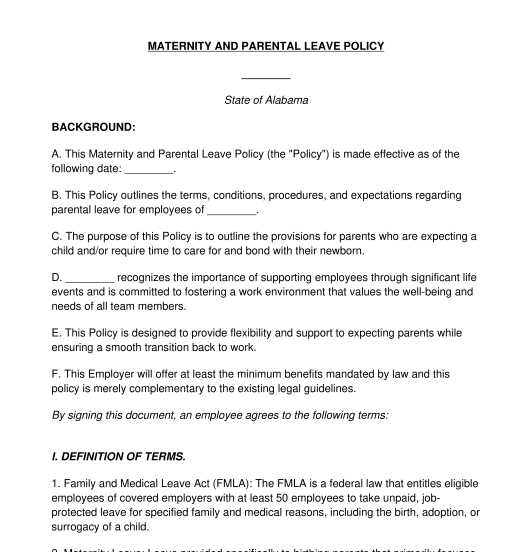 09/06/2025
09/06/2025

Answer a few questions and your document is created automatically.

Your document is ready! You will receive it in Word and PDF formats. You will be able to modify it.

 09/06/2025
09/06/2025
 Word and PDF
Word and PDF
 4 to 6 pages
4 to 6 pages



A Maternity and Parental Leave Policy is a document used by an employer that covers their policies regarding employee eligibility and the duration of maternity and parental leave.
Maternity leave and parental leave, though related, are two distinct types of leave offered by employers to support employees during significant life events related to the birth, surrogacy, or adoption of a child. While they both focus on family and caregiving responsibilities, they have key differences in their eligbility criteria, purpose, and who can take them.
Maternity leave is specifically for birthing parents and primarily focuses on their health and bonding with their newborns.
Parental leave is more inclusive and recognizes the caregiving responsibilities extend to fathers, adoptive parents, non-biological parents, and other parents who do not give birth. Offering parental leave emphasizes shared parenting and caregiving duties and has come to be an industry standard for employers who also offer maternity leave in recent years.
It is important for employers to have a clear maternity and parental leave policy, whether paid or unpaid, so that employees understand what the employer offers. Keep in mind that having a maternity and parental leave policy can differentiate a small business within an industry or community.
This Maternity and Parental Leave Policy is one of many employer policies available on this website. An employer creating this policy might also wish to create or update relevant related policies, such as a Remote Work Policy, for new parents who wish to transition to remote work for some period of time while adjusting to their new family, or an Employee Privacy Policy, for employees who wish to keep the specifics of their family creation private in the workplace.
This Maternity and Parental Leave Policy document is a comprehensive resource and includes everything an employer needs to create a customized leave policy for employees expecting children. In addition to outlining details about the employer, such as their number of employees and who, if anyone, has been selected to adminstrate this policy, this policy allows the employer to customize three main components:
The Family and Medical Leave Act, commonly known as FMLA, dictates that employers with 50 employees or more must offer FMLA leave. This leave allows eligible employees to take up to 12 weeks of unpaid leave in a 12-month period for specific family and medical reasons, including, most relevant here, the birth, surrogacy, or adoption of a child. This section outlines the eligibilty criteria, the maximum duration of leave, notice and documentation requirements, and job protection specifics.
Pregnancy-disability leave addresses the period when an employee is unable to work due to a pregnancy-related medical condition. This section covers the eligibility critieria, leave duration, accommodations offered before and after this leave, notice and documentation requirements, and job protection.
Maternity and parental leave are designed for bonding time between parents and their newborn or newly adopted child. This section focuses on eligibility critieria, leave duration, whether the leave varies between maternity and parental leave, whether there is compensation during this leave and, if so, how much, job protection, notice and documentation requirements, and customization options for employees to choose aspects of their leave plan.
After developing their maternity and parental leave policy, the employer should be sure to provide employees with a copy and have them sign and date the policy. It is also best practices to update the Employee Handbook, if one exists, to include verbiage about the policy. If desired, the employer can also document the employees' acknowledgement of the policy in their personnel files once they are returned.
Maternity and parental leave are the subject of both federal and state laws. The primary federal law affecting maternity and parental leave is the Family Medical Leave Act, which requires employers with 50 employees or greater to offer employees time off to care for their family in medical situations, including welcoming a child through adoption, surrogacy, or birth. Though there is no federal law about maternity and parental leave for employers with fewer than 50 employees, there are many state laws that may apply in these situations, depending on the state in which the employer is headquartered. Though this document includes the applicable state law where relevant, it is crucial for employers to stay informed about the legal framework that applies to FMLA leave, pregnancy disability leave, and maternity and parental leave.
You fill out a form. The document is created before your eyes as you respond to the questions.
At the end, you receive it in Word and PDF formats. You can modify it and reuse it.
Maternity and Parental Leave Policy - FREE - Template
Country: United States